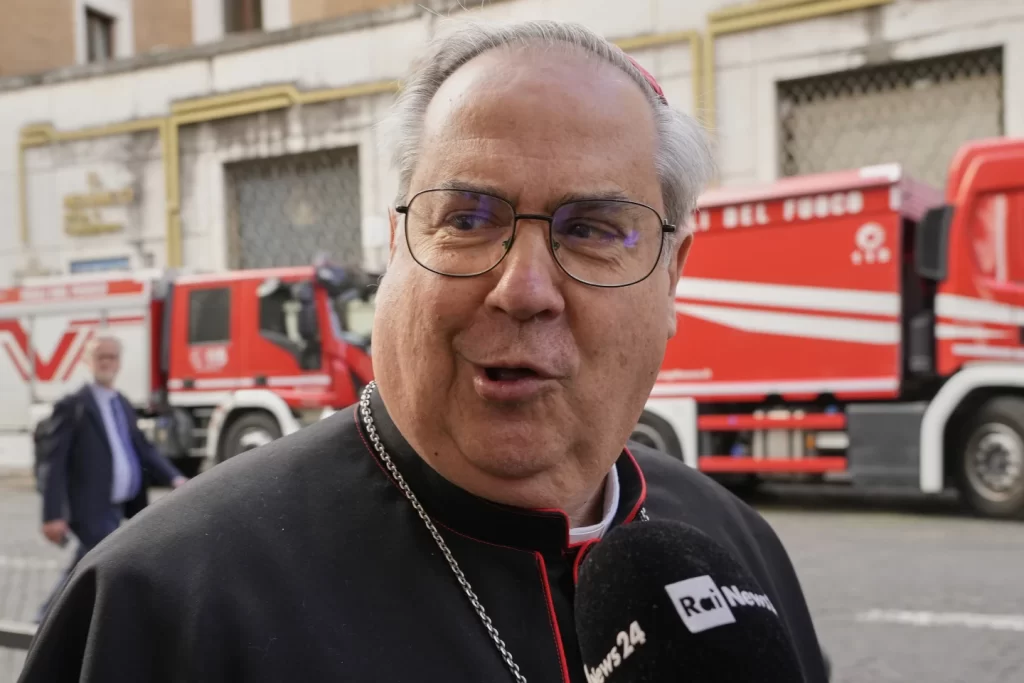
VATICAN CITY — Cardinals arriving for the first day of informal meetings after Pope Francis’ funeral were swarmed at the city-state’s gates by journalists eager for hints of whether any consensus was building around the election of a successor. A date for the start of the highly anticipated conclave could come as soon as Monday.
In a chaotic scene, journalists shouted out questions about the mood inside, whether there was unity, and when the conclave would begin. A reporter for a satirical Italian television program repeatedly asked whether an Italian cardinal who has been convicted by the Vatican criminal court on finance-related charges would be allowed to vote.
“There is the hope of unity,” said Argentine Cardinal Ángel Sixto Rossi, the 66-year-old archbishop of Cordoba who was made a cardinal by Francis in 2023.
Many cardinals cited the desire to continue Francis’ pastoral focus on people who are marginalized and against war. But conservatives in the ranks may be more focused on forging unity and refocusing the church back to core doctrines emphasized by St. John Paul II and Pope Benedict XVI, rather than continuing Francis’ social justice focus and outreach to women and gays.
British Cardinal Vincent Nichols, the 79-year-old archbishop of Westminster, was adamant that the church must strive for unity, and he downplayed divisions.
“The role of the pope is to essentially hold us together and that’s the grace we’ve been given from God,” said Nichols.
Venezuelan Cardinal Baltazar Enrique Porras Cardozo expressed confidence that once the conclave begins, a decision would be quick, “between two and three days.”
Cardinal electors
The College of Cardinals that will elect a new pope includes members from far-flung corners of the globe whom Francis named over his 12-year papacy to bring in new points of views of the Catholic Church hierarchy. Many have spent little or no time in Rome getting to know their colleagues, injecting some uncertainty into a process that requires two-thirds of the 135 voting-age cardinals to coalesce behind a single candidate.
Nichols acknowledged that the 135 cardinal electors — 108 of whom were appointed by Francis — don’t know each other very well. The last 20 were appointed in early December.
“We’ve got all week,” Nichols said as he arrived Monday.
Only cardinals under 80 are eligible to vote, and it is not clear how many of the 135 will participate. A Spanish cardinal has already said he won’t come to Rome for health reasons.
A big uncertainty is whether Cardinal Angelo Becciu, once one of the most powerful cardinals in the Vatican, will be allowed in the Sistine Chapel. Francis in 2020 forced Becciu to resign as head of the Vatican’s saint-making office and renounce his rights as a cardinal because of allegations of embezzlement and financial fraud. Becciu denied any wrongdoing but was put on trial in the Vatican criminal court and convicted of finance-related charges in December, 2023.
He is appealing the conviction and has participated in the pre-conclave meetings, but there is a lingering question about whether he is entitled to vote. The Vatican’s official statistics list him as a “non-elector.” When he was ousted in 2020, Becciu told a hastily arranged press conference that he wouldn’t be voting in any future conclave, but recently, he has insisted he is entitled to vote and canon lawyers have been poring over the Vatican document regulating the conclave to determine if he’s right.



